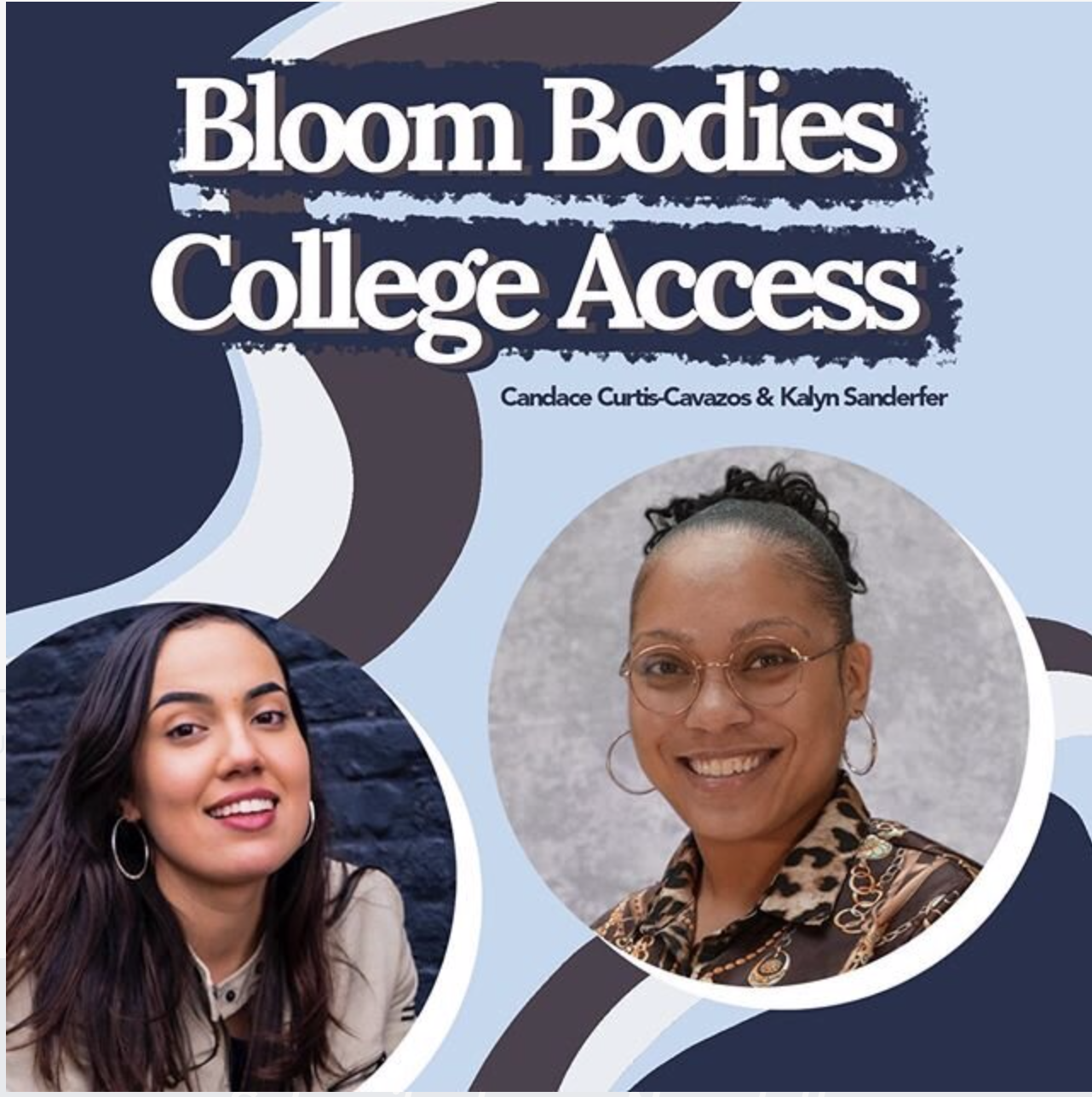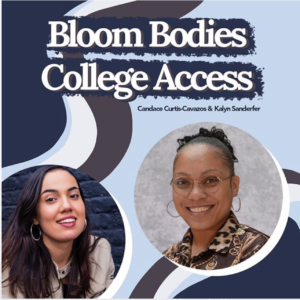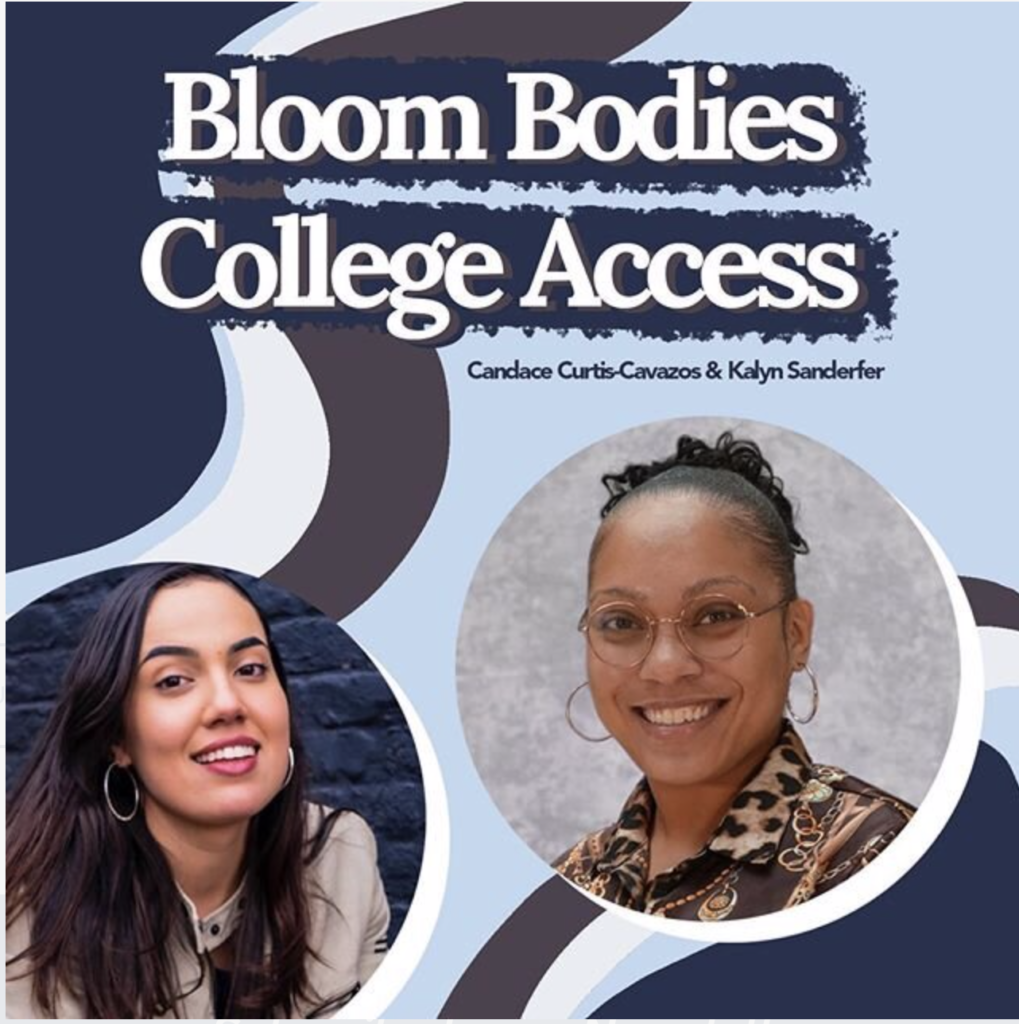Source: Michigan News

Candace Cavazos and Kalyn Sanderfer are doing more than college prep with their optiMize fellowship.

Candace Cavazos and Kalyn Sanderfer are doing more than college prep with their optiMize fellowship.
Candace Cavazos and Kalyn Sanderfer are using $9,000 awarded through the optiMize social impact program at the University of Michigan to grow their organization Bloom Bodies College Access. The Detroit-based educational program provides students from low income, black and brown communities with resources promoting college access, social justice education and opportunities for civic engagement.
In the past year, Bloom Bodies has hosted 9 open mic nights, 9 community dialogues, and 9 creative writing and performance workshops. Events are hosted at local venues and studios. All are free and open to Detroiters. For a few months they went virtual, but they are teaming up with Nandi’s Knowledge Cafe for a Juneteenth event tomorrow from 12-8 p.m. “Our crowds tend to be diverse and always changing,” Cavazos said. “People come from all parts of the city to see our guest artists and experience our unique open mic style.” Bloom Bodies has also collaborated on events with Detroit City Councilwoman Raquel Castenada-Lopez and organizations including Motor City Street Dance Academy, Living Arts and the Aadizookaan.

Bloom Bodies Instagram post on June 17, 2020.
Cavazos started Bloom Bodies in 2017, using YouTube and facilitated panels to empower Detroit youth “own their own narrative.” Cavazos had previous experience developing a successful college access program with the Mercy Education Project. Having just graduated with her Masters in Educational Leadership and Policy at the University of Michigan, Cavazos founded Bloom Bodies to combine empowerment and college access.
Kalyn Sanderfer, also a U-M alum with a Masters in Social Work, joined Bloom Bodies as a resource specialist before becoming a partner with Cavazos. In addition to college readiness, Bloom Bodies provides a support system to address social and community issues first-generation students may face.
“For kids from our communities, you cannot do that college access-type of work without talking about the social justice components and giving students the tools to be able to work through whatever life situations they are having,” Sanderfer said.
Bloom Bodies provides a curriculum that encompasses healthcare, financial aid, undocumentated status and communal living. Whether through guest lectures or “field trips” to local universities, Bloom Bodies connects students with professionals and community resources that will support them through their college journey. Participation is free to students. Events that are not hosted directly by Bloom Bodies are funded by schools and other nonprofit organizations.
The optiMize Community
Cavazos first heard of optiMize through friends and fellow members of The Guild, a poetry collective and past recipient of an optiMize grant. They encouraged Cavazos and Sanderfer to apply. Cavazos said that the optiMize workshops and networking events were amazing and resources such as tailored feedback, prototyping sessions, and budgeting tools allowed ideas for Bloom Bodies to become tangible.
Sanderfer noted that the network of student teams and community leaders provided a space for her and Cavazos to understand their program’s niche. They could discuss their strategies and mission with other teams involved in college access.
The women are also grateful for their optiMize mentors — Jeni Olney, associate director for Social Impact at optiMize, supported a work/life balance (Cavazos is a mother), and Kemi Dauda, Detroit Track Lead, made teams feel welcomed during events.
Current Change and Advocacy
Going forward, optiMize has encouraged Bloom Bodies to use its $9,000 fellowship funds to act on community needs. The two focuses this summer are the pandemic and hurt within the community over racial injustice.
Concerns over college readiness and support are only made worse by the shutdown of Michigan schools due to COVID-19. Over the past months, Bloom Bodies has transitioned to an online platform, hosting virtual open mic nights and compiling resources to prepare students for changes in the upcoming academic year.

Bloom Bodies Instagram post on March 15, 2020.
Cavazos and Sanderfer want to provide a support network that follows students through their first two years of college. This summer, they created a student-led “executive board” made up of Bloom Bodies members Diamond Davis, Brianna Bryant, Alicia Loza, and Anah Loza. Bloom Bodies used part of their optiMize funding to create micro scholarships for these students and will continue providing support and resources to them while at college. Bryant is currently at UM-Dearborn and Davis has plans to transfer to U-M from Wayne County Community College.
Bloom Bodies has also expanded its focus. The death of George Floyd while in police custody inspired a national movement to protest racial injustice. Cavazos and Sanderfer are using Bloom Bodies to support the black community.
During a time of tension, anger, and pain, Cavazos explains that it can be difficult for people to process their experiences and feel safe. Bloom Bodies is planning a series of retreats for its black members who are overwhelmed by both current events and longstanding issues. The goal is to “make sure that the people in our community have access to some safe and empowering spaces to just heal and process what’s going on in society and the world right now.”
A Call for Diversity
Their experience through optiMize helped Cavazos and Sanderfer appreciate the value of their individual and shared identities. Both from Detroit and first-generation college students, they understand the uncertainties of going to the university.
They believe Bloom Bodies is unique in how it addresses racial barriers head-on, with care to teach students about the history of what racism looks like in institutional systems.

Bloom Bodies Instagram post on May 9, 2020.
“A majority of students that come from low income communities of color do not graduate,” Cavazos acknowledged, citing that students often lack the resources to navigate “institutional systems that were not designed for them to enter, originally.”
Both Cavazos and Sanderfer believe creating change stems from inclusion and diversity at all levels, and they attribute Bloom Bodies’ success to their individual backgrounds and skills.
“I really do think it’s important to have black leadership at the table when you’re talking about serving youth of color,” Cavazos says, referencing Kalyn as her partner at Bloom Bodies. “When Kay came into the picture, not only was I super excited because she is incredibly qualified and an expert in her field, but also because she is a black woman who can speak on and has the insight and wisdom to know what our students really need.”
Sanderfer also recognizes the importance of allyship in creating positive change. “We need to be able to come together with people from different backgrounds so we can advocate on these issues in the most effective and appropriate way.”
Come back tomorrow: U-M students are giving back to Neighborhood United, a sports programing organization that taught them leadership skills. Using funds awarded through optiMize, these students are now leading the organization in its new focus to promote college readiness.


